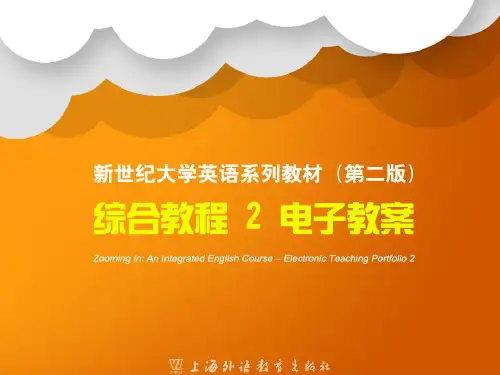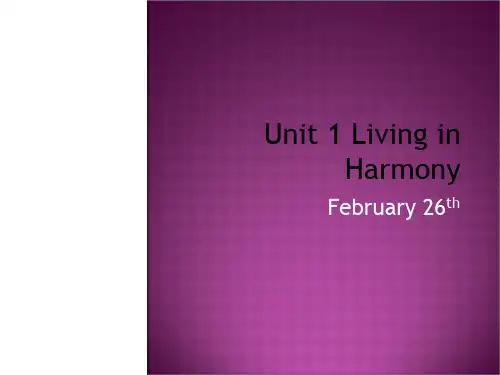新世纪大学英语教材第二版综合教程unit演示文稿
- 格式:ppt
- 大小:5.08 MB
- 文档页数:72
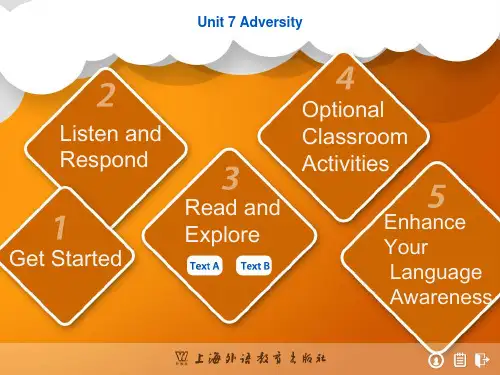
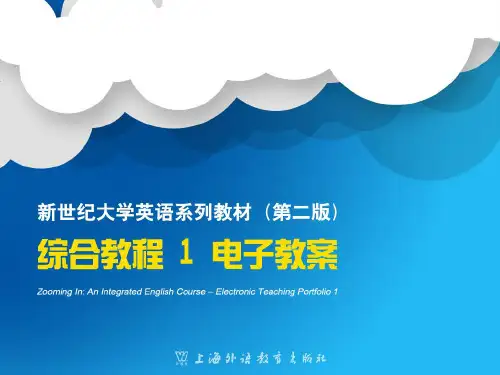
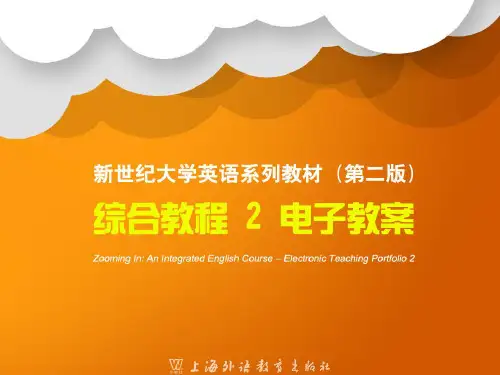
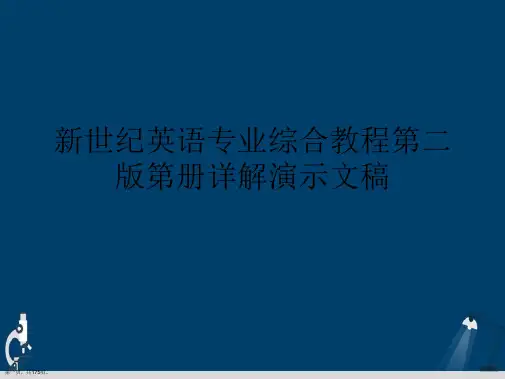
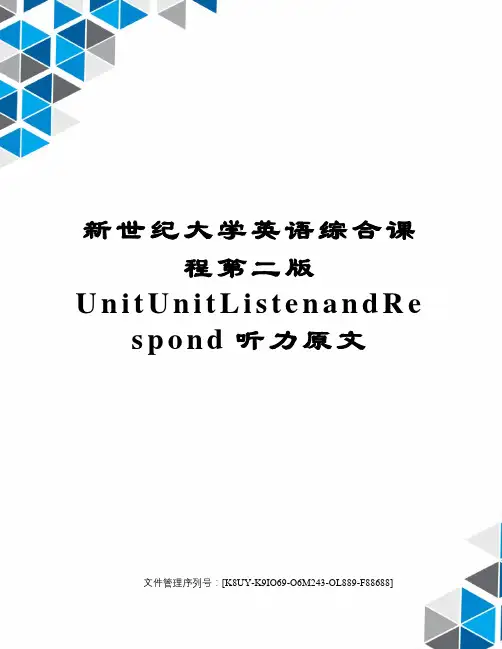
新世纪大学英语综合课程第二版U n i t U n i t L i s t e n a n d R e s p o n d听力原文文件管理序列号:[K8UY-K9IO69-O6M243-OL889-F88688]Unit 1 Living in Harmony[00:04.00]Listen and Respond[00:06.78]Smile[00:10.76]I am a mother of three and have recently completed my college degree.[00:16.57]The last project the professor assigned us to do was called “Smile.”[00:22.95]The class was asked to go out and smile at threepeople and then write down their reaction.[00:30.42]I am a very friendly person and always smile at everyone I meet and say “hello.”[00:36.54]So I thought that it would be a piece of cake for me. [00:41.52]Soon after we were assigned the project, my husband, [00:45.47]the youngest son and I went out to the local McDonalds on a cold March morning.[00:51.63]Just when we were standing in line, waiting to be served,[00:55.66]I smelled a horrible “dirty body” smell, and there standing behind me were two poor homeless men.[01:03.96]As I looked down at the shorter gentleman close to me, he was smiling.[01:09.48]His beautiful sky blue eyes were searching for acceptance.[01:14.19]He said, “Good day” as he counted the few coins he had.[01:19.73]The second man was mentally retarded.[01:23.65]The young lady at the counter asked the shorter man what they wanted.[01:28.38]He said, “Just coffee for the two of us.”[01:32.48]Obviously, it was all they could afford.[01:35.94]To sit in the restaurant and warm up, they had to buy something — they just wanted to be warm.[01:44.01]Then I was suddenly filled with sympathy.[01:47.18]All eyes in the restaurant were set on me, judging my every action.[01:52.74]I smiled and asked the young lady behind the counter to[01:56.79]give me two more breakfast meals on a separate tray. [02:00.93]I then walked to the table where the two men were sitting.[02:05.09]I put the tray on the table and laid my hand on the blue-eyed gentleman’s cold hand.[02:12.07]He looked up at me and said, “Thank you.”[02:15.98]I leaned over and said, “Just help yourselves.”[02:20.22]I started to cry when I walked away to join my husband and son.[02:25.10]As I sat down, my husband smiled at me and held my hand for a moment.[02:32.03]I returned to college, with this story in hand.[02:35.74]I turned in “my project” and the professor was touched and read it to the whole class.[02:43.20]The whole class was touched.[02:45.34]I graduated with one of the biggest lessons I would ever learn — UNCONDITIONAL ACCEPTANCE.Unit 2 Optimism and Positive Thinking[00:05.81]Listen and Respond[00:08.87]Attitude Is Everything[00:12.53]Michael was a natural optimist.[00:15.46]He was always in a good mood, always up and always had something positive to say.[00:22.52]If an employee was having a bad day,[00:25.29]Michael was there telling the employee how to look on the positive side of the situation.[00:31.51]Seeing his optimism really made me curious, so one day I went up to Michael[00:37.44]and asked him, “I don’t get it.[00:39.70]You can’t be positive all the time.[00:42.52]How do yo u do it”[00:45.24]Michael replied, “Each morning I wake up and say to myself: Mike, you have two choices today.[00:53.41]You can choose to be in a good mood or you can choose to be in a bad mood.[00:58.89]I choose to be in a good mood.[01:01.46]Each time something bad happens, I can choose to be a victim or choose to learn from it.[01:08.30]I choose to learn from it.[01:10.88]Every time someone comes to me complaining, I can choose to accept the complaining[01:16.56]or I can point out the positive side of life, I always choose the positive side of life.”[01:23.05]“Yeah, right.[01:24.25]But it isn’t that easy.”[01:25.94]I said.[01:27.13]“Yes, it is easy,” Michael said.[01:30.30]“Life is all about choices.[01:32.75]Every situation in life is a choice.[01:35.67]You choose how you react to situations; you choose how people will affect your mood; you choose how you feel. [01:43.93]The bottom line is: It’s your choice how you live your life.”[01:49.18]From Michael I have learned that every day we have a choice to live fully.[01:54.09]So I will choose to be an optimist.[01:56.80]If I am an optimist I may feel better, enjoy life more, and maybe have more chances of success.Unit 3 The Road to Success[00:05.83]Listen and Respond[00:08.68]Follow Your Dream[00:12.62]One day in a high school, a senior named Monty Roberts was asked to write[00:18.50]a paper about what he wanted to be and do when he grew up.[00:23.83]Monty Roberts was the son of a horse trainer.[00:27.54]He loved horses.[00:29.55]That night he wrote a seven-page paper describing his goal of someday owning a large horse ranch.[00:37.49]He wrote about his dream in great detail and he even drew a picture of a 200-acre ranch.[00:45.22]He put a great deal of his heart into the dream ranch [00:48.88]and the next day he handed the paper in to his teacher.[00:53.10]Two days later he received his paper back.[00:56.41]He got a large red F for his paper.[01:00.81]He went to ask the teacher why.[01:03.42]The teacher said, “The dream is impossible for you. [01:07.50]You have no money.[01:09.06]Owning a horse ranch needs a lot of money.[01:12.73]You have to buy the land, the house, and the machines for your ranch.[01:18.49]There’s no way you could ever do it.”[01:21.86]Then the teacher added, “If you will write this paper again[01:26.28]with a more realistic goal, I will reconsider your grade.”[01:31.32]The boy went home and thought about it long and hard. [01:35.09]He asked his father what he should do.[01:38.24]His father said, “Lo ok, son, you have to make up your own mind on this.[01:44.59]However, I think it is a very important decision for you.”[01:50.55]Finally, after sitting with it for a week, the boy turned in the same paper, making no changes at all.[01:59.39]He said to t he teacher, “You can keep the F andI’ll keep my dream.[02:04.34]I will follow my heart, no matter what happens.”[02:08.55]Now years have passed.[02:10.70]This young man’s dream has finally come true.[02:14.52]He is the owner of a large horse ranch.Unit 4 Being Creative[0:5.15]Listen and Respond[0:8.23]Creativity Is the Essence of Life and Nature[0:13.75]Creativity is the essence of life and nature.[0:17.65]The world itself is in a constant act of creation, so we human beings should ask ourselves — Why,[0:25.57]in such a creative world, do some people sometimes appear to be stupid, dull, and uncreative?[0:33.31]— Are people really dull?[0:35.38]Or are we all, in fact, creative?[0:39.12]To answer this, let’s look at a baby.[0:42.24]The whole essence of a baby is creative — it is creative in learning to walk, talk, sing, and play.[0:51.37]Just imagine, a child can create a world of its own imagination and play with it for hours.[0:58.85]A scientist who creates a theory is just like that —it is a play of ideas within the mind.[1:5.57]It is hard to stop creativity in a young child.[1:10.51]You can’t make your child creative.[1:13.57]It simply is creative.[1:16.96]Then, how can our children be still more creative? [1:21.67]I would suggest that the first step is to allow ourselves to be creative.[1:26.96]If we ourselves are creative, we can guide our children in a way that is free and unconditioned.[1:34.70]We should give our children a free and safe surrounding for them to explore, make mistakes and create. [1:42.06]If we know a better way to do things, we should guide or “help” the child.Unit 5 The Value of Life[0:5.18]Listen and Respond[0:7.62]Life is a Bottle of Rocks[0:11.23]A philosophy professor stood before his class with some items on the desk in front of him.[0:17.95]When the final student was seated, he picked up a large[0:22.13]and empty glass bottle and filled it with rocks about 2 inches in diameter.[0:27.98]He then asked the students if the jar was full.[0:31.38]They agreed that it was.[0:34.52]He then picked up a box of pebbles and added them to the jar, shaking it lightly.[0:40.88]The pebbles, of course rolled into the open areas between the rocks.[0:46.50]“Is this jar filled now”[0:48.81]Yes, the students said.[0:51.48]But then he picked up a bag of sand and poured it into bottle.[0:55.89]The sand filled in everything else.[0:58.67]Once more he asked if it was full and after some thinking they said that it was.[1:5.91]The professor then took 2 cans of beer and poured the beer into the jar.[1:11.73]The students laughed loudly.[1:15.17]After the laughter stopped, the professor spoke again: “I want you to recognize that this jar represents your life.[1:24.41]The rocks are the important things in your life, your family, your partner, your health,[1:30.67]your children — things that would still remain evenif everything else were lost, and your life would still be full. [1:39.37]The pebbles are the other things that matter — like your job, your house, your car.[1:45.74]The sand is everything else.[1:47.84]The small stuff.[1:49.26]If you put the sand into the jar first there is no room for the pebbles or the rocks.”[1:55.56]“The same goes for your life.[1:58.43]If you spend your life on small stuff, you will never have room for things that are important to you.[2:5.13]Pay attention to things that are critical to your happiness: your family, your health.[2:12.00]There will always be time to go to work, clean the house and so on.[2:17.03]Take care of the rocks first — the things that really matter.[2:21.61]Set your priorities.[2:23.44]The else is just sand.”[2:26.37]After the impact of what he said settled,[2:29.50]one of the students raised his hand and inquired what the beer represented.[2:34.70]“I am glad you asked.”[2:36.24]He replied.[2:37.54]“It just goes to prove that no matter how full your life may seem,[2:41.99]there is always room for a couple of beers.”Unit 6 Learning to Work Together[0:5.84]Listen and Respond[0:8.63]Be a Team Player[0:11.12]If you really wish to succeed in life, it is very important to be a team player.[0:16.87]For example, in a basketball game, Michael Jordan is a great player,[0:21.82]but he still has to cooperate well with his team members to win a game,[0:26.38]because every member of his team has a very specific role[0:30.22]and every member of the team is vital to the success of the team.[0:34.75]If one player does not play well, the team will lose the game.[0:39.62]Of course, the concept of teamwork applies to more than just sports.[0:44.54]In the workplace and in school, working together is also an important element for success.[0:51.34]In the workplace, it is important to be thought of as a team player,[0:55.83]for no one person can build a railroad or manage an airline.[1:0.59]In today’s world most companies are using team concepts to run their business.[1:6.92]Success in college can also depend on teamwork.[1:10.48]Lab work and group projects are just some of the experiences requiring good cooperation with others.[1:18.69]Human beings are social creatures.[1:21.12]Like it or not, we are all team players.Unit 7 Adversity[0:4.50]Listen and Respond[0:6.95]Carrots, Eggs and Coffee Beans[0:13.10]A daughter complained to her father about her life and how things were so hard for her.[0:19.41]She did not know how she was going to make it and wanted to give up.[0:24.85]Her father, a cook, took her to the kitchen.[0:29.72]He filled three pots with water and placed each on a high fire.[0:35.16]When the water came to a boil, he placed carrots in one of them,[0:40.19]eggs in the second pot, and coffee beans in the third. [0:44.66]His daughter waited impatiently and wondered what he was doing.[0:50.12]In about twenty minutes he took out the boiled carrots and eggs and placed them in two different bowls.[0:58.26]Then he poured her a cup of coffee.[1:2.31]He turned to his daughter, and asked her, “What do you see”[1:7.09]“Carrots, eggs, and coffee,” she replied and asked, “What does it mean, Father”[1:14.08]He explained that the carrots, eggs and coffee beans each had faced[1:20.02]the same adversity, boiling water, but each reacted differently.[1:25.79]The carrots went in strong and hard but came out softened and weak.[1:31.09]The eggs had been weak.[1:33.26]But after being boiled their inside became hardened. [1:37.59]The coffee beans were unique, however.[1:40.51]After they were boiled in the boiling water, they had made the water taste better.[1:47.09]Then the father asked his daughter, “When adversity knocks on your door, how do you react?[1:53.82]When life isn’t turning out quite the way you expected, you have a choice to make.[1:59.17]Which will you be — a carrot, an egg, or a coffee bean?[2:4.74]If you are like the coffee bean, when things are at their worst,[2:8.94]you get better and make things better around you.”Unit 8 Human Behaviour[00:04.44]Listen and Respond[00:06.96]The Unexpected Rescue[00:10.29]I was walking along a dark street late one evening when I heard screams coming from behind some bushes.[00:17.57]Alarmed, I slowed down to listen, and realized that what I was[00:21.93]hearing were the sounds of a hard fight and tearing of clothes.[00:26.33]Only yards from where I stood, a woman was being attacked.[00:30.41]Should I get involved?[00:31.82]I was frightened for my own safety and cursed myself for having suddenly decided to take a new way home.[00:39.28]Shouldn’t I run to the nearest phone and call the police?[00:43.53]Although the thoughts in my head had only taken seconds, already the girl’s cries were growing weaker.[00:50.78]I knew I had to act fast.[00:53.30]How could I walk away from this?[00:55.52]No, I finally decided.[00:57.53]I could not turn my back on the fate of this[01:00.19]unknown woman even if it meant risking my own life. [01:05.00]I am not a brave man, nor am I a strong man.[01:08.33]I don’t know where I found the courage and physical strength,[01:12.15]but once I had finally decided to help the girl I seemed to have changed into another man.[01:18.62]I ran behind the bushes and pulled the attacker off the woman.[01:22.77]While struggling, we fell to the ground,[01:25.23]where we wrestled for a few minutes until the attacker jumped up and escaped.[01:30.38]Breathing hard, I approached the girl, who was sobbing behind a tree.[01:34.97]In the darkness I could barely see her outline, but I could sense her trembling shock.[01:41.17]Not wanting to frighten her further, I spoke to her from a distance.[01:46.04]“It’s OK.”[01:47.20]I comforted her.[01:48.80]“The man ran away.[01:50.62]You are safe now.”[01:53.81]There was a long pause...[01:56.25]I heard the words in amazement.[01:59.21]“Daddy, is that you”[02:01.97]And then, from behind the tree, stepped out my youngest daughter, Katherine.。
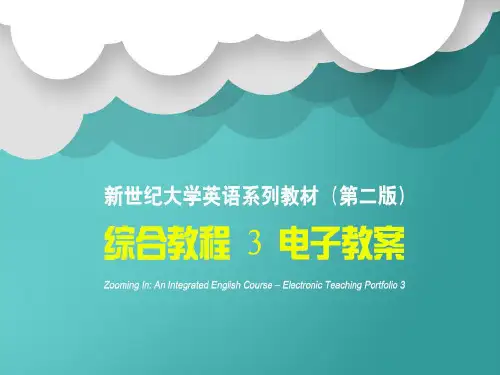
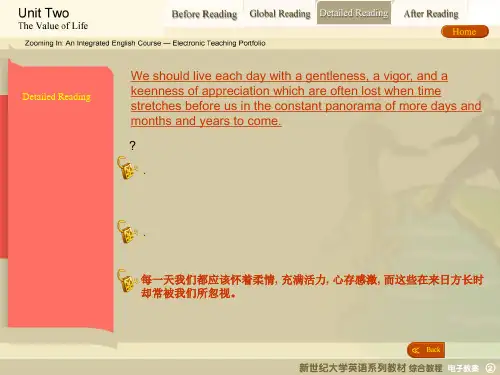
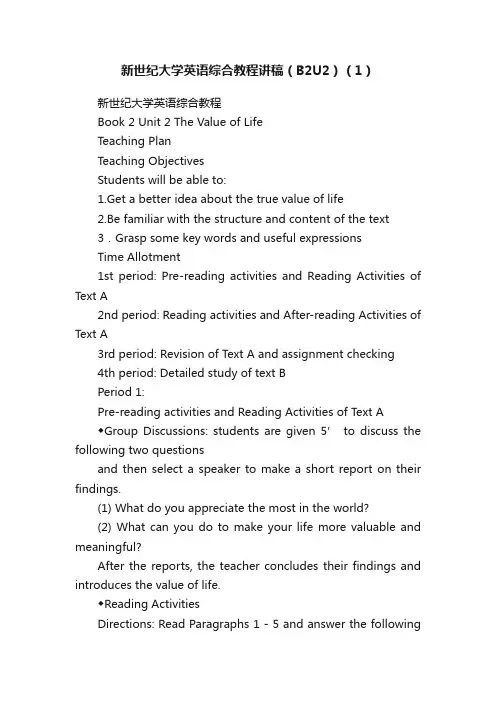
新世纪大学英语综合教程讲稿(B2U2)(1)新世纪大学英语综合教程Book 2 Unit 2 The Value of LifeTeaching PlanTeaching ObjectivesStudents will be able to:1.Get a better idea about the true value of life2.Be familiar with the structure and content of the text3.Grasp some key words and useful expressionsTime Allotment1st period: Pre-reading activities and Reading Activities of Text A2nd period: Reading activities and After-reading Activities of Text A3rd period: Revision of Text A and assignment checking4th period: Detailed study of text BPeriod 1:Pre-reading activities and Reading Activities of Text A◆Group Discussions: students are given 5’ to discuss the following two questionsand then select a speaker to make a short report on their findings.(1) What do you appreciate the most in the world?(2) What can you do to make your life more valuable and meaningful?After the reports, the teacher concludes their findings and introduces the value of life.◆Reading ActivitiesDirections: Read Paragraphs 1 - 5 and answer the followingquestions.1. Why does Helen Keller think that it would be an excellent rule to live each day as if we should die tomorrow?2. According to Helen Keller, what is the right way to live each day?3. What does Helen Keller mean by saying that most of us take life for granted?4. What does Helen Keller think of the attitude that most of us adopt towards our faculties and senses?Directions: Read Paragraphs 6-10 to see whether the following statements are true or false.1. People are blessed if they are stricken blind and deaf.2. Helen showed disbelief when her friend said she had seen nothing particular duringa long walk in the woods.3. Helen thought that she “saw”more things than the seeing people just through touch.4. Blind as she was, Helen was more sensitive to the world than us healthy people.5. The seeing should make better use of sight to add fullness to life.3. After the general understanding of the passage, students are required to find the main ideas of each partPart 1 (1-4) Most of us take life for granted. The author suggests that we live each day with gentleness, a vigor, and a keenness of appreciation as if we should die tomorrow.Part 2 (5-10) we should also make full use of our faculties and senses so as to live afuller and richer life.Period 2-Period 3Reading activities and After-reading Activities of Text AReading ActivitiesPara 1-3Underlining good usage: as long as a year/as short as twenty-four hours/speak of free men/sphere of activities/strictly confined/such stories set us thinking/under similar circumstances/crowd intoKey words and expressions:1)Condemn: e.g. he was found guilty and condemned to death.2)Set sb doing sth: e.g. anything could set me laughing in those days when I felt sohappy with my life and work.3)Under …circumstances: e.g. under no circumstances should you lend Paul anymoney.4)Stretch: e.g. endless hot summer days stretched out before us.Para4-5Underlining good usage: take life for granted/picture that day as far as in the future/days stretched out endlessly/apply to/suffered loss of sight/it is the same old story ofKey words and expressions;1)take …for granted: e.g. her husband did all the housework, and she just took it forgranted.2)Picture: e.g. she pictured herself at school in a foreign country.Picture sb or sth as: she’s been pictured as a difficult, demanding woman.3)The same old story: e.g. it’s the same old story for Brazil heading into next year’sworld cup finals: everyone is aiming for the five-time champions.Para 6-8Underlining good usage: stricken blind/make him more appreciative of sight/nothing in particular/worthy of note/delicate symmetry of a leaf/something of the miracle of the Nature is revealed to me/the happy quiver of the bird in full song/delighted to have cool waters of a brook rush through my open fingers/a thrilling and unending dramaKey words and expressions:1)worthy of: e.g. these points are worthy of your attention.2)Sign: e.g. call the police at the first sight of the trouble.3)Reveal: e.g. his letters reveal a different side of her personality.4)Stream: e.g. Tears streamed from her eys.Para 9-10:Underlining good usage: at times my heart cries out with longing/get much pleasure from/as a meanings of adding fullness to life.◆After-reading ActivitiesAsk Ss to talk about what they would do if they only had one week left to live. and provide some help during their discussion◆Assignment1)Ask Ss to recite one of their favorite part of the text2)Ask Ss to finish the exercise after the text.Period 4:Revision of Text A and assignment checkingDetailed study of text B◆Ask students to read the text and figure out the main idea of the text◆The teacher put forward several questions and asks students to find theinformation contained in the text1)what was the author thinking about sitting in the training?2)In her dream, what was her father doing?3)Can her father help her with the debt?4)To whom does the author owe her first debt of gratitude?5)What is the author’s biggest debt? Why is it so?6)What is the father’s final comment on all her debt of gratitude?◆Discuss the exercises of Text B。
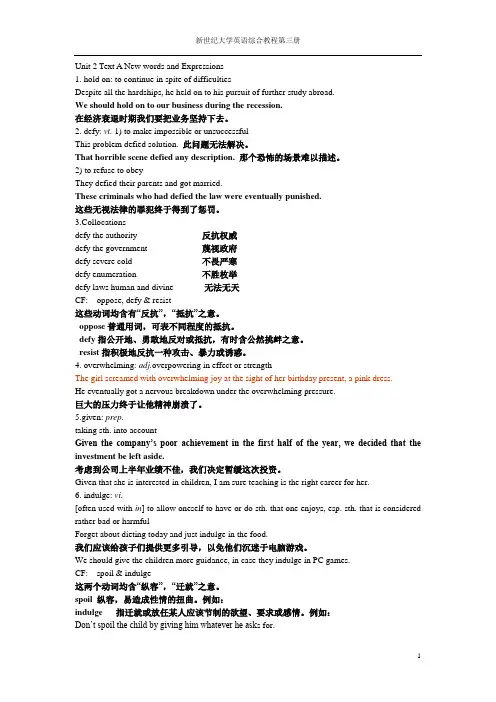
Unit 2 Text A New words and Expressions1. hold on:to continue in spite of difficultiesDespite all the hardships, he held on to his pursuit of further study abroad.We should hold on to our business during the recession.在经济衰退时期我们要把业务坚持下去。
2.defy: vt. 1) to make impossible or unsuccessfulThis problem defied solution. 此问题无法解决。
That horrible scene defied any description. 那个恐怖的场景难以描述。
2) to refuse to obeyThey defied their parents and got married.These criminals who had defied the law were eventually punished.这些无视法律的罪犯终于得到了惩罚。
3.Collocationsdefy the authority反抗权威defy the government蔑视政府defy severe cold 不畏严寒defy enumeration不胜枚举defy laws human and divine 无法无天CF: oppose, defy & resist这些动词均含有“反抗”,“抵抗”之意。
oppose普通用词,可表不同程度的抵抗。
defy指公开地、勇敢地反对或抵抗,有时含公然挑衅之意。
resist指积极地反抗一种攻击、暴力或诱惑。
4. overwhelming: adj.overpowering in effect or strengthThe girl screamed with overwhelming joy at the sight of her birthday present, a pink dress.He eventually got a nervous breakdown under the overwhelming pressure.巨大的压力终于让他精神崩溃了。
